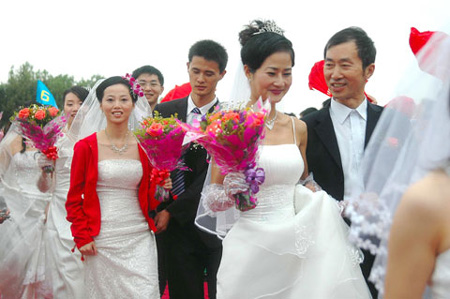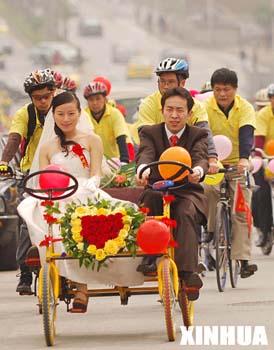Newlywed couples walk on a bridge at the West Lake in Hangzhou, eastern China's Zhejiang province on Saturday, October 13, 2007. About 100 couples from across the country took part in the group wedding ceremony. [Photo: newsphoto]
When Xu Lin and her groom decided to marry, they got on their bikes and cycled around the hilly streets of the south China city of Chongqing.
Dressed in the traditional wedding dress and morning suit, the pair led a wedding procession of more than 200 people all on bicycles last year.
But the couple weren't just out for the fresh air and exercise -- they were at the forefront of a new trend that is bucking the standard Chinese conception of an elaborate and very expensive wedding.
The "bicycle wedding", in which couples accept the good wishes of passersby, is taking its place alongside group weddings and the burgeoning market in second-hand wedding clothes and paraphernalia as a way to avoid extravagant and prohibitively costly celebrations.
Driven by rising soaring food prices and the rising cost of living, young couples are searching for innovative -- and much cheaper -- ways to celebrate their commitment to each other.
"The uniqueness and economy of the bicycle wedding were the big attractions," says Xu Lin. "It was a memorable day and it didn't leave us out of pocket."
The couple's friends were also relieved to avoid the burden of giving the newlyweds traditional red envelopes filled with money, an obligation that grows heavier according to the level of dining and entertainment they receive at expensive hotels and restaurants.
The new budget awareness is spurring new businesses.
Chen Dandan has earned 10,000 yuan since August by selling used wedding closes and accessories on-line.
"The less money you pay, the more happiness you gain," her personal homepage proclaims.
A traditional Chinese qipao dress costs 150 yuan here, almost half the market price. Shoes, suits, invitation cards, almost everything needed at the ceremony is at least 30 percent cheaper than the same items brand new.
"There's a high demand for these goods as more people recognize the waste of spending a lot on things we only use once," Chen says.
Wedding expenditure in China usually covers clothes, jewelry, a banquet, photographs and the honeymoon.
A survey by the Beijing Municipal Bureau of Statistics showed newlyweds in Beijing spent an average of 53,645 yuan (7,457 U.S. dollars) on their weddings last year.
The city's per capita disposable income was 21,989 yuan, meaning an average Beijing resident had to work more than two years to pay for an average wedding.
This year, costs are predicted to rise by 20 percent thanks to strong inflation and an expected marriage boom.
China's CPI (consumer price index) was up 4.8 percent last year, and jumped 7.1 percent last month year-on-year, mainly driven by food price rises, which were the highest in more than a decade.
Many restaurants have raised prices accordingly. Beijing's Great Wall Sheraton Hotel has raised the minimum price per table from 2,888 yuan to3,288 yuan, a total rise of 4,000 yuan for a 100-person banquet.
What's more, because it's the year of the Beijing Olympic Games, and the number eight is considered auspicious for wealth and fortune, a marriage boom looms.
The demand for hotels, wedding planning agencies and related services is already increasing.
Li Pei, of Shanghai Tiandi Wedding Service Company, says her company is already booked up till November, and, like other wedding planners, her company is raising prices by 20 percent this year.
"It's natural to raise prices as the demand rises," she says.
The increasing costs have failed to deter those with deep pockets. One couple in Chengdu, Sichuan Province, famously spent 10,000 yuan riding two Akhal Teke horses, of only five in China, into their wedding ceremony because they wanted "to feel like a prince and princess".
But for most people, a wedding is still a heavy burden.
Xu Fei, 24, a Shanghai restaurant cashier, was losing sleep over how to meet expectations of a memorable wedding within a budget.
"My fiance and I couldn't afford an elaborate ceremony, but we wanted it to be as memorable as possible," Xu says.
Their prayers were answered when her fiance's construction company offered to hold a group wedding in May because seven young employees were to marry this year. The cost per couple: just 2,000 yuan.
For China's young men, who are expected to outnumber women by 25 million by 2030 due to a gender imbalance, the rising cost of getting married, including buying a home, has prompted many to give up altogether.
A survey of registered residents by the society and population studies department of Guangdong Academy of Social Sciences found 21 million single people aged over 15 in the province, 32 percent of all adults, up eight percent from 1996, indicating a growing army of bachelors.
The expense of marriage definitely contributes to the increase in bachelors, especially considering the new requirement of housing, according to department deputy director, Zuo Xiaosi.
"A sewing machine, a bicycle and a watch, which used to be three necessities of marriage, cost several months of income in the 1980s, but now an apartment costs at least ten years pay," Zuo said.
Including a home, the average expenditure in cities reached 560,000 yuan, said the Report on China's Marriage Industry Development by the Ministry of Commerce and China's Wedding Expo in 2007.
The report prompted comments on Internet bulletin board systems, including: "I have no choice but to be a bachelor" and "Marrying a computer seems to be much cheaper."
(Xinhua News Agency February 20, 2008)



